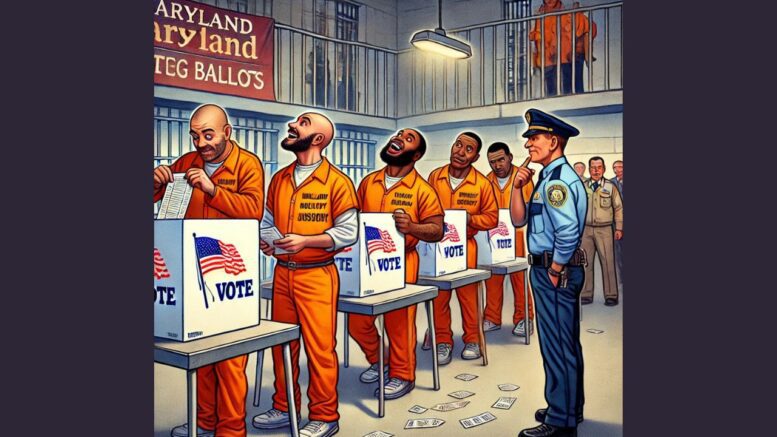The hallowed halls of Maryland’s 90-day tax-and-spend bonanza, where common sense goes to die, and progressive fantasy bills are born at an alarming rate.
This year, Silver Spring’s Delegate Jheanelle Wilkins and Prince George’s County’s Senator C. Anthony Muse have introduced yet another taxpayer-funded, soft-on-crime giveaway that will have law-abiding Marylanders shaking their heads in disbelief.
House Bill 710 and its Senate counterpart, Senate Bill 647 — the “Voting Rights for All Act,” is a charmingly deceptive name for legislation restoring voting rights to violent convicted felons actively serving their prison sentences.
You read that correctly.
While Maryland taxpayers struggle with inflation, out-of-control crime, and yet another budget shortfall, Maryland progressive lawmakers have decided that their top priority is making sure convicted murderers, rapists, and drug traffickers can vote from the comfort and convenience of their prison bunks.
Let’s talk about it.
Maryland House Bill 710 & Senate Bill 647: Convicted Felons Voting from Behind Bars
1. Taxpayer-Funded Voter Hotline Bling for Inmates
This legislation would require the Maryland State Board of Elections (SBE) to create and maintain a toll-free hotline for incarcerated individuals in Maryland prisons so they can:
- Receive information about voting;
- Request election-related materials (voter registration forms, absentee ballots, etc.);
- Report voting rights violations.
And who will be paying for this special election concierge service for inmates?
You and me – hardworking, middle-class Maryland taxpayers.

The legislation would require the Department of Public Safety and Correctional Services (DPSCS) to work with SBE to develop regulations for operating this inmate-only voting helpline.
I don’t know about you, but I can think of a few better uses for taxpayer money than subsidizing a hotline for convicted violent felons to whine about their “voting rights violations.”
Why don’t we just pay for inmate phone calls while we’re at it?
Oh wait, Jheanelle Wilkins is co-sponsoring HB 401 – a 2025 bill that mandates Maryland taxpayers cover the costs of every phone call made by incarcerated individuals in Maryland state prisons.
Voting behind bars and free inmate phone calls!
2. Felons in Prison Get Their Voting Rights Back
Maryland law prohibits convicted felons from voting while actively serving their prison sentences, a policy shared by 48 other U.S. states.
But HB 710 and SB 647 erase that restriction.
Under this this legislation:
- All convicted felons, regardless of their crime, can register to vote while serving their prison sentence;
- Maryland would join only Vermont and Maine in letting incarcerated murderers, rapists, and violent offenders participate in elections;
- Criminals get the same say in electing Maryland’s lawmakers as the law-abiding citizens they victimized.
If passed, the bill would eliminate the requirement that Maryland courts report felony convictions to the State Board of Elections.
What does this mean?
It means that election officials will have no way to verify whether an inmate should be eligible to vote.
What could possibly go wrong?
3. Repealing Penalties for Voting While Ineligible
Under current Maryland law, any felon who attempts to vote while serving their sentence commits a felony punishable by one to five years in prison.
But HB 710 eliminates this penalty entirely.
There’s no legal consequence if a Maryland inmate illegally votes under this bill.
Imagine being a law-abiding Marylander who accidentally votes in the wrong district — you’d be fined or even prosecuted.
But if a convicted violent felon serving a twenty-year sentence for armed robbery votes illegally?
Nothing happens.
Felony Fun: Which Marylanders Pay for This Voting Expansion?
You might be thinking: Surely, Del. Jheanelle Wilkins and Sen. Anthony Muse included a dedicated funding mechanism for this program, right?
Wrong.
According to the Maryland Department of Legislative Services Fiscal and Policy Note, the cost of this bill is:
- $4,400 annually for the state (General Fund);
- $4,400 annually for local governments.
Total cost: $8,800 per year
It’s a seemingly small price tag – for now.
But let’s get real: this is only the beginning.
Once Maryland’s prison hotline is fully operational and prison voter turnout skyrockets, the cost of maintaining and expanding this program will balloon.
And where does that money come from?
Maryland’s General Fund — the same money pot that’s supposed to pay for:
- Public schools;
- Police and first responders (;
- Road repairs and transit projects;
- Healthcare and economic development
Remember when you hit a pothole in Silver Spring or Takoma Park, or your kids’ public schools could not afford to cover the costs of a critical extracurricular activity?
Remember this:
Maryland Democrats prioritized paying for convicted prisoner voting over fixing our state’s infrastructure.

The Bigger Picture: Why This Prisoner Voting Bill Is Bad Policy
Stripping away the performative progressive rhetoric reveals this legislation as radical, unnecessary, and irresponsible.
- Violent convicted felons are in prison because they broke the law;
- Voting is a fundamental right, but rights come with responsibilities;
- If you commit a felony and are sentenced to jail, losing your right to vote is part of the deal.
Maryland already has some of the country’s most lenient felon voting laws — allowing individuals to vote immediately after serving their time, even while on parole or probation.
That’s reasonable; it’s fair. That’s rational.
But allowing violent convicted felons to vote from prison?
That’s insanity.
But that’s the far left in Maryland.
Key Questions Marylanders Should Ask About Legislation Allowing Violent Felons to Vote From Prison
- Why should violent felons serving their sentence get to vote?
- Why is there no funding plan for this hotline?
- Why did this bill remove felony penalties for voting while ineligible?
- Should violent criminals get a say in electing prosecutors, judges, and lawmakers while serving their time behind bars?
- What actual problem is this bill solving?


